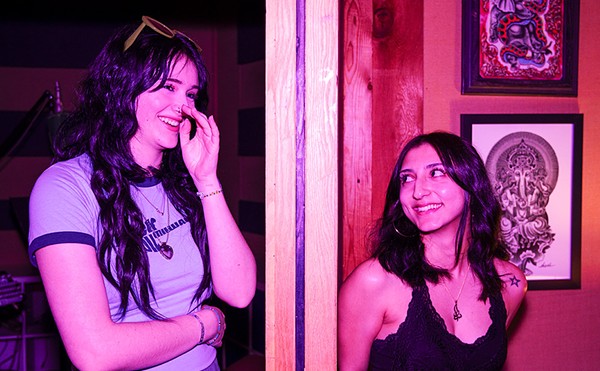The last choice turns out to be the case: Think of a synonym for each of the two words, and the answer is there (hint: the second word is "sucker."). Not necessarily the most inviting of names for a musicians' collective/record label, but one that sticks in your head, so to speak.
"When I went to register — we're officially incorporated and all that stuff," laughs Ouija drummer Sue Rose, "I got a bank account with our name, Rooster Lollipop, on the checks, and the little old lady at the bank said, "Oh, that's so sweet, Lollipop Records.' Then she looked again and was like, "I don't know what that rooster is, though.' And I was thinking, "Oh God, I hope she doesn't figure it out.'"
In a city that's frustratingly absent of dedicated record labels to release the music of St. Louis artists, the fact that Rooster Lollipop hesitates to call itself a record label per se only adds to the frustration. (The mystery of the St. Louis music community, one that stretches from blues to jazz to country to rock, from hip-hop and R&B to electronica, is: Why no labels? Where are the savvy business types or fanatic music heads willing to do the research, drop the cash and start a viable record label in St. Louis? Where's the vision? Where's the good taste?) But Rooster Lollipop is not a label, or so they say, though their logo appears on releases and their name appears on all the fliers associated with their "roster" of artists. Rather, they're a collective grouping of bands, all of which play around the city, that began organizing a couple years ago in an effort to pool resources and brainstorm, or, more simply, to create a community.
"Our intention when we started," says Rose with the focus indicative of her role as president of the collective, "was to work as a cooperative effort for all the bands that were all friends with each other to pool resources and work together on projects so that we could all afford to do more by working together." Rooster Lollipop, at this point, includes several St. Louis rock bands: the Highway Matrons, Ouija, the Tics, Fran, Tinhorn, the Geargrinders (though they're apparently on some sort of hiatus), the Homewreckers, the Phonocaptors, Pompous and Rocket Park. Past members have included Johnny Magnet and the Tripdaddies.
The results of pooled resources, collective inspiration and communal bliss will be on display Saturday, Aug. 14, at the Way Out Club — Rooster Lollipop's "home away from home," says Rose — when they throw "Axes and Snackses," a part showcase, part recording project, part bash/barbecue dedicated to highlighting the Lollipop aesthetic and inspiration.
If the idea of a musicians' collective on the surface sounds a bit, well, hippie for you — especially in the fragmented St. Louis rock community — the truth is the exact opposite. The structure that Rooster Lollipop has designed for itself is as pragmatic as it is creative: For a nominal fee, required of each participating band, all they offer is support and an umbrella identity; the rest is up to the individual bands. This structural support comes mainly in the form of three things: a Rooster Lollipop newsletter, a mailing list and a group compilation. The fringe benefits, though, are much more valuable: a creative, supportive community. Says Mark Stephens, guitarist and vocalist for the Highway Matrons: "A lot of people approach it and misunderstand it and think it's a label, and I think for the most part that's why we end up with people who are sincere — because it's not like we're offering a hell of a lot, except for a community for the bands." Stephens, who was the originator of the Way Out Club Christmas Pageant (he started it long ago at Cicero's, when it was sponsored by his first band, the Boorays), says that since the rise of Rooster Lollipop, projects that were once the responsibility of individuals are now community efforts. "These people show up early — at least for musicians — on Sundays and ask, "What should I do?'" he says, amazed.
The individual bands, however, do most of the grunt work themselves: They still must finance their own releases and book and promote their own shows. Rooster Lollipop is simply a support system and a peer group.
"What we offer," says Stephens, "is, one, we've got the tax-ID number and a number of legal things that most bands couldn't afford on their own, which makes it a lot easier for bands to sell their product. And also, (we have the ability) to pool money. "Axes and Snackses" is designed to pool some money for advertising funds, which the average band isn't going to be able to do on their own."
"People can write their check to Rooster Lollipop," continues Rose, "instead of to, say, Tom Buescher (of Fran), and then it all has to go on his taxes. Then we realized, what we could do is figure out how much these things are going to cost to do, that we all want to do but can't individually afford. We can figure out how much that is and then divide it up so that everybody just pays a little bit monthly. Then we can afford to print this newsletter really nicely and mail it out to everyone."
It gets tricky, though, on examination of the pieces; more than just a collective, there is a Rooster Lollipop aesthetic, one that permeates the bands' sounds and sticks between their beats. The guitar is king with the Lollipop bands, and all seem to come out of the punk rock, "here's three chords — now go start a band" aesthetic. Some have a bit more twang; others go straight for the throat. A few suck; others are inspired. What they share, though, is a reckless enthusiasm for music, one that places celebratory expression above musicianly chops, one that views music as an art, not a commodity. The Rooster Lollipop aesthetic is closely tied to Stephens' colorful images; he came up with the logo, designs most of the fliers and has created a look that evokes the spirit of the collective.
The magnet that drew the bands together in the first place is the Way Out Club, the glorious South City venue whose strict policy of mainly booking local acts (as opposed to most rock clubs in town, which concentrate on touring acts) has resulted in a vibrant, thriving scene. Owners Bob Putnam and Sherri Lucas have what is virtually a roster of house bands, most of which are associated with Rooster Lollipop. "It wouldn't have worked if we hadn't had the support of Bob and Sherri," says Buescher. "We can pick a night for these types of things, and they'll make it work for us."
"They made a big point of supporting local music," says Rose, "whereas other bars would book bands from all over the country — which is good — but there wasn't really a home for St. Louis music, and that's what this bar is."
"Axes and Snackses" promises, as the name implies, loads of guitars and food. In the grand tradition of any Rooster Lollipop event, the gig seems to be taking on a life of its own, and, with so many people providing so much, slowly evolving into an extravaganza. Included in the festivities, which begin at 7 p.m., are games, a kissing booth (featuring Highway Matrons drummer Freddy Friction — customers are invited to pay Friction for a kiss, pay him to kiss someone else or, perhaps most important, pay him not to kiss), food and, the highlight of the evening, performances by 10 Rooster Lollipop bands. The show will be recorded, and the end result will be a second Rooster Lollipop collection (the first was the inspired Way Out Club collection).
The collective is evolving; Rose, Stephens and Buescher often say that they're still not exactly sure what Rooster Lollipop is. In the future, though, are a few concrete plans. Says Buescher: "It's growing kind of slow because everybody's got their own stuff to do; it's to the point where we're about ready to work on the T-shirt shop in the basement. We move so slow because you make incremental progress every month. This ("Axes and Snackses") is our focus now, and after that it's probably going to be the darkroom and the silkscreening in the basement.
"As soon as we get the screen printing set up," adds Stephens, "I thought it would be cool — instead of just printing T-shirts — to print fabric with band names on it; we've got a lot of people who sew really well. We could make clothing out of the fabric — so people could buy a Ouija minidress, or a Highway Matrons cowboy shirt."
Rooster Lollipop is still a St. Louis-centric organization. Their distribution is limited to a few area record stores and a tiny display case at the Way Out Club. On the national independent-rock scene, the collective has yet to make any impact. They're working on a Web site and are in the process of booking ads in national magazines. From there, they'll need better distribution, as well as a broader vision. Otherwise, only a handful of people in the area will ever utter that magical name, and Rooster Lollipop will continue to be South City's little secret — which, in the end, would be a crime.





